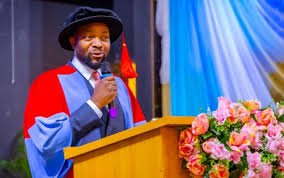In a major push towards a tech-powered economy, the Federal Government of Nigeria has trained 200,000 citizens in artificial intelligence, hoping to spark innovation and sustainability across various sectors. This milestone was announced at the 10th Annual Symposium and Awards of the American Chemical Society (ACS), Nigeria International Chemical Sciences Chapter, held at the National Open University of Nigeria (NOUN) in Abuja.
Speaking on behalf of the Minister of Innovation, Science and Technology, Chief Uche Nnaji, Dr Patricks Oghuma noted that Nigeria is standing at a unique crossroads where artificial intelligence and chemistry intersect to shape the future. “We are at the intersection of a revolution where artificial intelligence and chemistry converge to create new frontiers,” he said, stressing that this blend could lead to groundbreaking solutions in sustainability and innovation.
He lamented that many innovative research efforts in Nigeria never go beyond academic journals. “Too many brilliant scientific contributions remain buried in journals, never reaching industries or policymakers who can implement them,” he added, calling for more real-world applications of science through AI integration.
AI and Chemistry: A New Frontier for Sustainable Development
Echoing the Minister’s views, NOUN Vice-Chancellor, Professor Olufemi Peters, underscored how AI is already transforming the field of chemistry. He pointed out its role in reducing waste, conserving energy, and optimising chemical processes—crucial factors in driving sustainable growth. “At NOUN, we remain committed to providing accessible, technology-enhanced education that directly addresses national and global challenges,” he affirmed.
He challenged the audience to move beyond theoretical discussion. From AI-powered green chemistry to smart manufacturing, he stressed the importance of turning these ideas into practical strategies that support a knowledge-based economy.
Professor Edu Inam, Chair of the ACS Nigeria Chapter, reaffirmed the organisation’s dedication to grooming the next generation of scientists. She mentioned ongoing outreach programmes and campus initiatives designed to encourage student research and mentorship.
The symposium, which attracted thought leaders from the scientific, academic, and public sectors, emphasised the need for stronger collaboration between researchers, industries, and the government. Participants agreed that AI has the potential to revolutionise sustainability if effectively harnessed.
- OpenAI’s Advertising Ambitions: ChatGPT Set to Enter the Ads Game
- Nigeria Ranked 72nd for AI Readiness … But What Does That Actually Mean for You?
- AI Readiness: See Where Nigeria Ranks According to Oxford
- Nigeria Opens First National AI Centre at the University of Jos
- OpenAI Introduces ChatGPT Health for Wellness Support
- Aptech Unveils Cross-Border AI Degree for Nigerian Tech Students













3 replies on “Nigeria Trains 200,000 in AI to Power Sustainable Innovation”
[…] is preparing to launch new regulatory AI sandboxes that will allow innovators to safely test artificial intelligence systems while […]
[…] Intelligence”, a smart electronic medical records tool that simplifies clinical workflows using AI-driven […]
[…] The government’s credit revolution is also targeting Nigeria’s younger population through a bold new initiative called YouthCred. The programme is expected to launch with 400,000 beneficiaries — beginning with members of the National Youth Service Corps (NYSC) — and will cater to individuals aged 18 to 35. […]